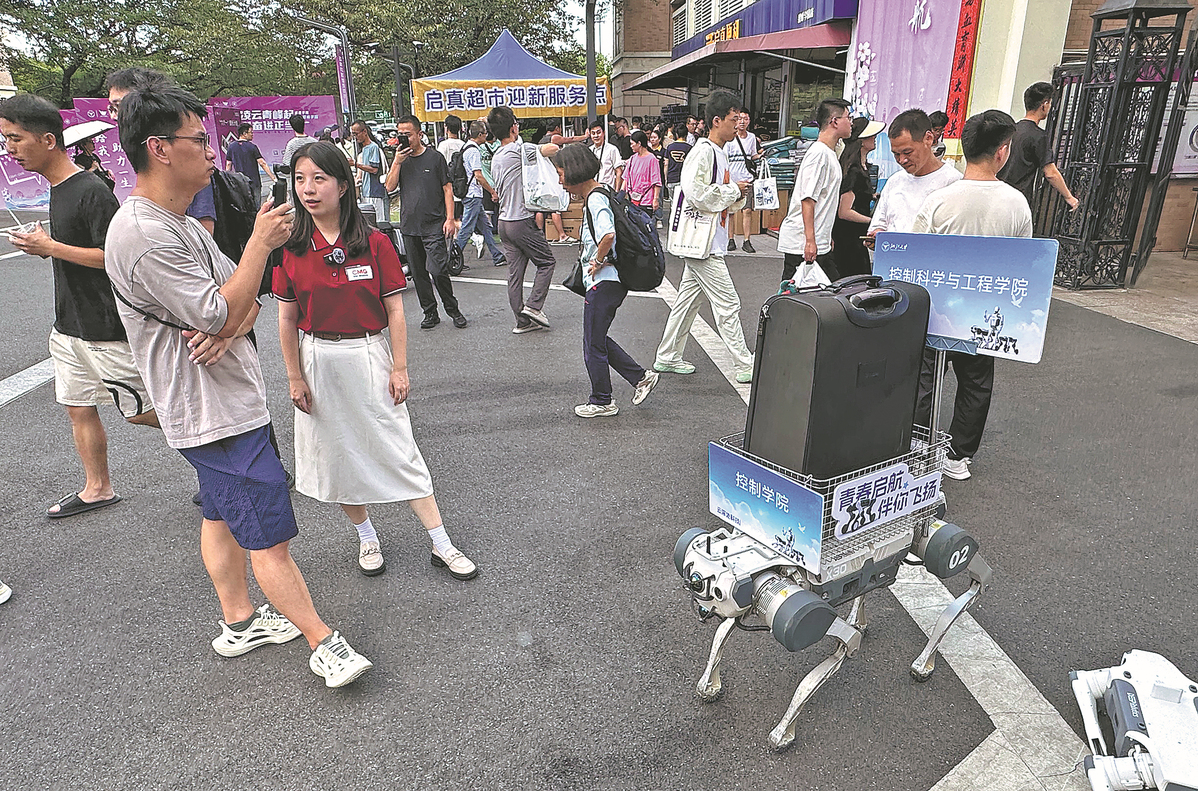Warm welcome from robotic dogs wows students


The Zhejiang University's Zijingang campus recently turned into an exhibition of innovation as a team of robotic dogs helped welcome new students, building a joyful atmosphere and helping with luggage.
Three models of robotic dogs developed by DEEP Robotics — the Lite3, the X30 and the Lynx M20 — were deployed to the campus, each assigned with specific tasks ranging from entertainment to heavy lifting duty. These agile machines quickly became the highlight of the event, fascinating both students and parents with their versatility and advanced functionality.
The Lite3 models were the entertainers of the squad. Capable of dancing to music with moves that include spins, jumps and front flips, these quadruped robots brought energy and excitement to the crowd. They also served drinks to newcomers with steady precision, a feature that impressed many.
Facilitating their playful actions were lightweight bodies, high-torque joint modules and sophisticated motion control algorithms. These features enable the robots to perform complex tasks such as crossing gaps and greeting people with remarkable fluidity.
The X30 models did the heavy lifting. Capable of carrying luggage weighing up to 85 kilograms with ease, they took over the role traditionally played by parents and student volunteers.
The X30s navigated stairs, stone paths and other uneven terrain while steadily transporting suitcases and supplies marked with the university's logo. Equipped with multi-sensor fusion technology, they identified obstacles and adapted their paths in real-time, ensuring safe and efficient delivery of cargo. Their reliability and strength instantly attracted the attention of onlookers, many of whom took photographs while marveling at the robots' abilities.
The Lynx M20 model stood out with its hybrid wheel-leg design, which combines speed with stability. It switched seamlessly between rolling on flat ground and walking on stairs or up slopes. Even on wet or uneven surfaces after rain, the robot was still able to maintain its balance and transport items securely.
This adaptability enables it to navigate common campus obstacles such as speed bumps and ramps, earning it the nickname "campus courier".
The robotic dogs developed by DEEP Robotics, a high-tech company founded by Zhu Qiuguo, an associate professor from Zhejiang University, serve as practical examples of how academic research can translate into real-world applications.
More than just tools, they represent a blend of innovation and warmth, offering new students a first glimpse into the university's practical and innovative culture.
"It's really convenient. I can't even imagine how exhausting carrying luggage would be without help from the robot," said Lin, who was assisted by an X30 model. "Zhejiang University has truly gone to great lengths to help us new students."
Besides Zhejiang University, many other universities in China, including Xi'an Jiaotong University, also applied advance technology to welcome its freshmen, introducing both virtual and physical intelligent assistants to support new students.
The university launched "Jiao Xiaoxin", an AI-powered chatbot built on its AI innovation platform "Jiao Xiaozhi". This smart application combines knowledge bases, workflow systems and large language models to offer services including answering questions, navigation and smart recommendation.
Meanwhile, the humanoid robot "Xun Xiao", developed by the university's robotics institute, met students at several locations on campus. It shook hands and took photographs with newcomers at the south gate of the Xingqing campus, answered questions about campus network services at information desks and even guided students to specific service counters.
Notably, Xun Xiao appeared at the recently held 2025 World Humanoid Robot Games in Beijing, where it demonstrated its strong cross-scene adaptability and interactive functions.





































